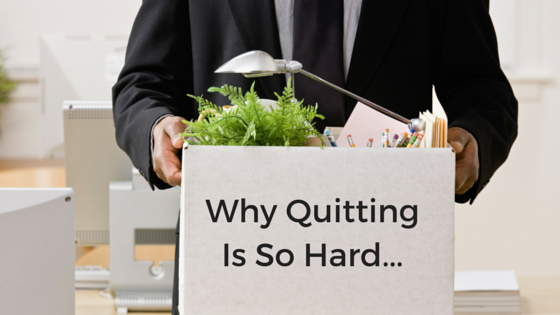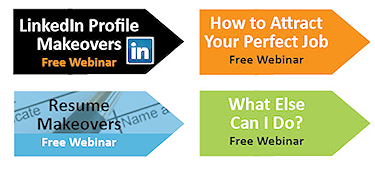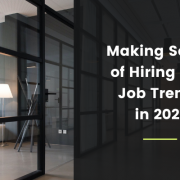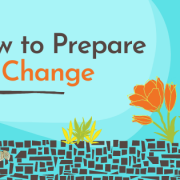Why Quitting Is So Hard – Especially If You’re a Winner
Changing Careers

It’s hard for me to quit something. I keep trying to make things work – jobs, relationships, a broken door handle, whatever. I stay focused on making things work way too long past the freshness expiration date. I guess this makes me a bad quitter.
Despite me knowing this about myself, I find it hard to give up on something. “If I just try doing it this way, it might work…” Great if you’re doing a team building challenge with paper clips and plastic straws, not so helpful if you’re just repeating dumb mistakes over and over again.
Enter Freakonomics. Are you a fan? I am. You’ve probably heard about their books. If you haven’t caught their radio show, I highly recommend it. I get my freak on through podcasts.
If you’re not familiar with the franchise, it’s a partnership between an economist and a journalist. Together, they explore topics such as the poor design of public restrooms, why people keep having children, whether the U.S. should merge with Mexico and other, dare I say, oddball topics. They usually interview researchers, analyze studies or research and then present how our beliefs or “theories” on certain subjects either hold weight or not. Take the topic of quitting.
Last week, this topic was in my face. In the so-close-you-can’t-ignore-it sort of way. New clients were asking me whether they should quit their job or stick it out (save yourself my consultation fee — I can’t make that decision for you).
Long-time clients were emailing to ask whether they were crazy for even considering quitting their jobs because they are so sick and tired of struggling. Then, ta-da, I made the business decision to let-go a corporate client after determining the costs were outweighing the benefits. We all have to make these “keep or let go” decisions as we amble through life, and it’s not easy, is it?
On a sunny February afternoon in Portland, I was standing at the edge of my driveway, and I’m all ready to take myself on an invigorating walk. Scrolling through my iPod, Freakonomics’ The Upside of Quitting, caught my eye.
The premise of this segment? Sometimes quitting can be strategic. And it can be your best plan. Did you know there’s evidence that quitting is good for you? Physiologically and psychologically. It makes us less depressed. Lowers our cortisol levels.
But here’s the deal – as humans, we tend to over-justify our behavior. Especially if we “suffer for” something.
But the point that really stuck with me is how hard it is for people to quit their jobs. Duh, right? No, I mean there’s a real reason: cognitive dissonance. Remember from your undergrad psych class? Cognitive dissonance is when we hold two or more contradictory values, thoughts or beliefs. Our natural instinct is to reduce this dissonance by increasing the consistency between our expectations and reality – and we often do this by justifying our thoughts.
What’s the classic advice for anyone who’s facing the “should I quit” dilemma? Create a pro/con list. Those lists are a classic way to reduce cognitive dissonance. In theory, at least.
So why is it so hard to quit? Are you familiar with Zappos’ offer to pay employees to quit? Much has been written about it and how more companies should adopt this incentive – the goal of the program is to weed out people who want the money incentive more than they want to fit into the culture of Zappos.
But here’s the deal – as humans, we tend to over-justify our behavior. Especially if we “suffer for” something. Zappos excels at selecting their trainee employees, and before they make the “we’ll pay you to quit” offer, the employees feel like part of the family. If the employee has bonded with the company, they experience cognitive dissonance and don’t want to quit.
And we like suffering for something – and if we suffer for it, we draw the conclusion that we must love it. Fraternities, sports teams, religious teams all use this idea of “cognitive dissonance” too – by fueling our intense desire to belong and justify our behavior. As a result, very few trainees end up taking Zappos’ “pay to quit” offer.
Quitting is hard.
Struggling is hard.
But believing that winning means that you never quit, well, ask yourself if that’s working for you. Plus, how else can you account for all of the clients who tell me, months later, that quitting their job was the best thing they ever did? Clearly, they’re onto something.

I’m Stacey Lane: Confidence Builder. Networking Smarts. Resume Wordsmith. Personal Branding Strategist. Career Coach.
I help individuals with unique backgrounds find their perfect fit and effectively market themselves so they find work that is as interesting as they are.
Contact me to get started!
 FREE Webinars to watch at your convenience: Watch “How to write powerful cover letters” here. Want to makeover your LinkedIn profile or learn job-seeking tips & tricks? Need to makeover your resume? Or figure out what your next career will be? Need help attracting the perfect job to you? Learn more and signup for my FREE webinars here.
FREE Webinars to watch at your convenience: Watch “How to write powerful cover letters” here. Want to makeover your LinkedIn profile or learn job-seeking tips & tricks? Need to makeover your resume? Or figure out what your next career will be? Need help attracting the perfect job to you? Learn more and signup for my FREE webinars here.




